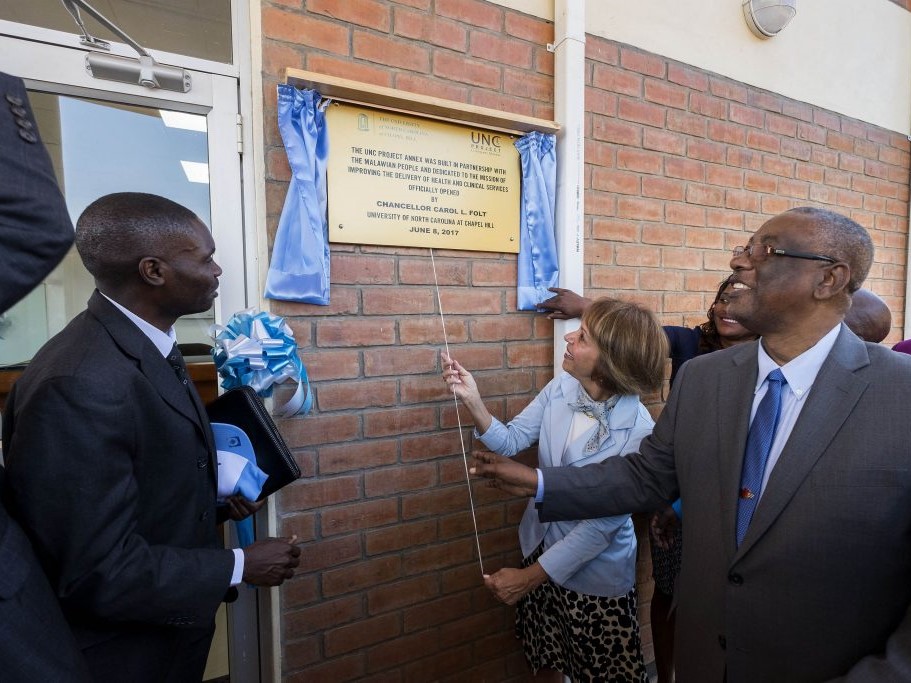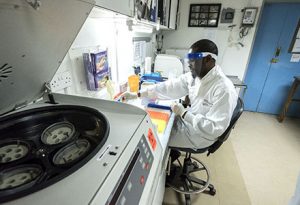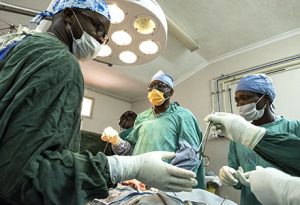Making an Impact as a Global University
July 7, 2017University Communications
 Chancellor Carol L. Folt was on hand in Malawi for the dedication of a new library and annex at the Kamuzu Central Hospital. The site is part of a 20-year collaboration between UNC-Chapel Hill, the Malawi Ministry of Health and the Kamuzu Central Hospital.
Chancellor Carol L. Folt was on hand in Malawi for the dedication of a new library and annex at the Kamuzu Central Hospital. The site is part of a 20-year collaboration between UNC-Chapel Hill, the Malawi Ministry of Health and the Kamuzu Central Hospital.
The University of North Carolina at Chapel Hill’s heelprint extends far beyond the borders of North Carolina.
To better understand just how Carolina’s faculty and researchers are impacting lives around the world, Chancellor Carol L. Folt traveled almost 8,000 miles to Zambia, Malawi and Kenya.
By visiting Carolina partners and meeting with high-level diplomats, Folt saw firsthand how the University’s programs are aiding the developing world and then bringing that knowledge back to North Carolina.
“The experience really underscored what it means for Carolina to be a global university,” she said. “Without question, the discoveries our faculty and staff have made and continue to make in Africa are impacting the world.”
The week-long trip began in Zambia, where Folt visited with Carolina faculty members who are partnering with the Ministry of Health, Kabwe General Hospital and the University Teaching Hospital of Zambia to provide training in diagnostic and surgical techniques for treating breast and cervical cancer.
Part of the UNC Global Women’s Health division, the program serves as a proving ground for new technologies that improve efficacy and patient outcomes with the mission of eradicating cervical cancer in Zambia. In just seven years, the program has screened more than 50,000 Zambian women for cervical cancer.
Folt also worked with University of Zambia leaders to formalize Carolina’s partnership with the African university. Through the partnership, the two universities hope to renovate portions of the University of Zambia’s Teaching Hospital and introduce more UNC-Chapel Hill schools into the relationship.
During her time in Zambia, Folt met with Zambia’s Prime Minister of Education Nkandu Phoebe Luo, who has been a strong supporter of Carolina’s programs in the country.
“This relationship is critical to our ongoing research and training efforts in Zambia,” Folt said.
Carolina’s global mission was in full force in Malawi, as the Chancellor traveled to Lilongwe to visit the site of a 20-year collaboration between UNC-Chapel Hill, the Malawi Ministry of Health and the Kamuzu Central Hospital.

UNC Project-Malawi is a clinical research site for the NIH Division of AIDS that conducts trials in all five HIV networks — treatment, prevention, infants and mothers, microbicides and vaccines. The project has played a key role in many landmark HIV trials over the years.
In the past decade, the project has expanded its research to include cancer, malaria, injury prevention, surgery and nutrition.
Established by UNC faculty and now consisting of more than 375 employees, the project focuses on training the next generation of physicians and scientists through specialized medical training for Malawian physicians and doctorate-level training in public health and lab sciences. The program also trains undergraduates.
Folt had the opportunity to meet with a group of UNC-Chapel Hill medical, pharmacy, public health and College of Arts and Sciences students doing research in Malawi. They will contribute to the research efforts on the ground in Malawi, and bring transformative lessons back to Chapel Hill.
“Although the distance may be great, you are close to our hearts,” Folt told members of the UNC project. “You are a shining light of Carolina’s work around the world.”
While at UNC-Project Malawi, which is based out of the Kamuzu Central Hospital, Folt was on hand for the dedication of a new library and annex at the hospital.
The dedication, which was also attended by U.S. Ambassador to Malawi Virginia Palmer, officially opened the 15,242-square-foot research annex which houses the UNC Project-Malawi Lineberger Cancer offices and a pathology lab that helps staff seek improved cancer treatments for the developing world. The state-of-the-art facility allows scientists to reduce biopsy analysis times from six months to just a few days.

“UNC is among the best research universities in the world, but to stay at the top we need to be a global university. We are one species and we have to work together as one global team,” said Myron Cohen, Carolina’s associate vice chancellor for global health. “The discoveries made in Malawi have made an impact across the whole world. The work done here in this small country can have a disproportionate impact on our entire species.”
In her last stop in Africa, Folt visited Nairobi, Kenya, where she met with Robert Godec, U.S. ambassador to Kenya, and Brenda Muntemba, Zambia’s high commissioner to Kenya, to discuss ways Carolina researchers can work with partners to address the issue of youth empowerment and unemployment.
While in Kenya, the Chancellor also visited Carolina for Kibera — a nonprofit started by Carolina alumnus Rye Barcott and two members of the Kibera community.
Serving the children of the large neighborhood in Nairobi, Carolina for Kibera aims to promote leadership through sports, community development and empowerment programs such as the Binti Pamaja Girls Program, which focuses on rights and equality for adolescent girls. The visit also highlighted a partnership between Carolina for Kibera and a new center in the School of Social Work, Global Social Development Innovations, aimed at improving employment outcomes for youth in Kibera.
“Whether it’s in Zambia, Malawi or Kenya, Carolina faculty, staff, students and alumni are addressing critical issues facing the developing world,” Folt said. “By working together with universities and medical facilities throughout Africa, UNC-Chapel Hill is impacting the lives of millions across the world and bringing that knowledge back to North Carolina.”
Photos by Jon Gardiner, University Communications
